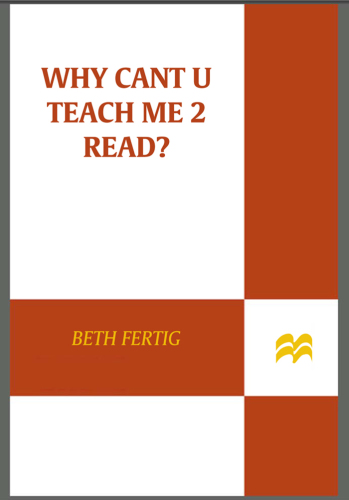
Why cant U teach me 2 read?
Three Students and a Mayor Put Our Schools to the Test
کتاب های مرتبط
- اطلاعات
- نقد و بررسی
- دیدگاه کاربران
نقد و بررسی

July 27, 2009
New York City radio journalist Fertig delves deeply into the success and failure of the federal No Child Left Behind Policy implemented by President George W. Bush in 2002, especially as Mayor Michael Bloomberg took up the challenge to improve reading, writing and math skills in New York City public schools. Using the case studies of three impoverished students of Dominican descent—Yamilka, 23; her brother Alejandro, 19; and Antonio, 18, who all came through these high schools and remained largely illiterate despite an enormous enlistment of school services (Yamilka, for example, was later awarded $120,000 worth of tutoring hours for “educational neglect”)—Fertig unearths some knotty issues affecting the scholastic success of inner-city students, such as English as a second language, family environment and, especially, misdiagnosis of learning disabilities such as dyslexia. Fertig looks closely at how corporate-minded Bloomberg shook up the system: forcing schools to demonstrate annual progress by testing and by gathering specific data (implementation of ARIS, the Achievement Reporting and Innovations System); sanctions for schools not performing; grading of schools in terms of their students' progress. The outrage was predictable, but the improvements surprising and real. Fertig tracks the efficacy of the “balanced literary” approach to reading and the harmful effects of text messaging and e-mail, for an overall excellent, thoroughly grounding survey of the state of literacy and education.

August 15, 2009
An NPR reporter tackles the often overlooked American illiteracy problem through the stories of three students and one very troubled school system.
For 23-year-old Yamilka, illiteracy was literally crippling. Because she couldn't perform basic cashier's tasks, figure out her medication or even read the subway signs, she was essentially captive in her Bronx home. Astoundingly, Yamilka is a high-school graduate with a diploma in hand from the New York City public-school system. Her brother, Alejandro, and another student, Antonio, had similar experiences. All had learning disabilities that went undiagnosed or untreated for years, and all three were raised in Spanish-speaking families by parents who didn't know how to advocate for them during their schooling. In many ways, these are still remarkable cases. Fertig found them because they had all legally challenged the school system for their illiteracy and won hundreds of thousands of dollars in private tutoring—it's terrifying to think that there are many other students in similar situations who haven't gone to such lengths to rectify their situation. The author's chronicle of their private education gives fascinating insight into what went wrong in their public education. With enough time and attention from professionals who went to great lengths to figure out how they learned, each student became functional if not avid readers. Fertig tries to reconcile these methods with the problems facing the NYC public-school system, and emerges with a surprisingly optimistic look at the future of education. While large urban school systems will never have the resources that private tutors were able to give to these three students, both Mayor Bloomberg's improvements to the NYC public-school system and the 2002 No Child Left Behind Act offer hope that at least the situation may soon become less dire.
Carefully considered treatment of a troubling subject that will be particularly useful to educators and policymakers.
(COPYRIGHT (2009) KIRKUS REVIEWS/NIELSEN BUSINESS MEDIA, INC. ALL RIGHTS RESERVED.)

October 27, 2009
In her first offering, radio journalist Fertig attempts to explain "what it takes to teach every child to read, at a time when literacy is essential." Here, readers are given a crash course on the history of special education; the effect of the No Child Left Behind legislation in New York schools under the leadership of Mayor Bloomberg; the challenges faced by struggling readers; and various reading-instruction techniques. Fertig also relates the stories of Alejandro, Yamilka, and Antonio, all children of Dominican immigrants, who successfully sued the New York public school system for failing to teach them to read. Fertig's assertion that the debate about reading is "really about the best ways to help children overcome poverty and the best ways to help children overcome [the] legacy of racism" is sure to spark debate. Verdict This is an ambitious exploration of the myriad cultural and socioeconomic issues influencing learning. Readers looking for an inspirational happily-ever-after resolution are sure to be mildly disappointed.-Tamela Chambers, Chicago P.L.
Copyright 2009 Library Journal, LLC Used with permission.

Starred review from September 1, 2009
Public radio reporter Fertig offers a view of the crisis in education through the lens of three young adults struggling with illiteracy. Yamilka, Alejandro, and Antonio, all products of New York public schools, legally challenged the system when it failed to teach them to read, securing special tutoring arrangements designed to compensate for years of neglect. Fertig intersperses their accounts with the politics of education reform in New York during the mayoral administration of Michael Bloomberg. A new data system and decentralization were part of the citys efforts to reform itself and keep track of thousands of mostly minority and poor students who fall through the crackssome eventually graduating, though they cannot read. Fertig details the heartbreaking struggles of the three students, who can barely read subway signs but long for careers in the military, entrepreneurship, and catering. Fertig also details various learning disabilities and historical and current research on techniques for teaching reading skills, the role of standardized tests, and the impact of video games and the Internet on reading skills. She notes that debates about reading are often really about the best ways to help children overcome poverty and the legacy of racism.(Reprinted with permission of Booklist, copyright 2009, American Library Association.)

























دیدگاه کاربران